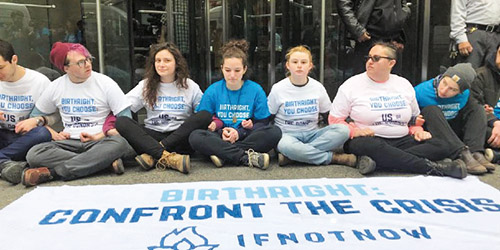
Speaking to a group at last month’s Israeli conservatism conference, former U.S. Ambassador to Israel David Friedman was asked how best to “sell Zionism” in America.
Before delving into his reasoning, the former ambassador answered that “selling Zionism” first requires “selling Judaism.” Friedman correctly maintains that Zionism rooted in the belief that Israel exists as a Jewish state will inevitably unite the “political left, right, and center.” He argues that Jews must stop trying to appease antisemites by “bifurcating Zionism and Judaism.”
Decades ago, being raised in a pro-Israel household, taking a Birthright trip and living within a Jewish community protected against the anti-Israel hostility that a young Jewish student might encounter on campus. But today, U.S. Jews are being peddled a brand of popularized universalism that often demonizes Israel. As a result, the repackaged antisemitism, which partners a hatred of Israel with progressive causes, is neglected and, increasingly, is bolstered by some in the Jewish community.
Moreover, an affinity for Israel based on expressed parental support does not advance the Israel literacy required to combat contemporary antisemitism, or give Jewish students the critical thinking tools necessary to counter anti-Israel propaganda spouted at them on campus.
Addam
With an attachment to Jewish peoplehood already weakened, the crucial work of organizations like Birthright Israel and StandWithUs is not strong enough to teach young Jews the truth about what is happening in Israel and “Palestine.”
Most will already be exposed to social media postings decrying Israeli “apartheid,” and media lies falsely accusing Israel of war crimes. In California, as part of the K-12 ethnic studies curriculum, students may have previously completed coursework affirming that Israel is a “settler state” founded on “genocide.”
Accruing the resiliency and knowledge to combat anti-Zionism will inevitably raise critical and, at times, uncomfortable questions.
Like all countries, some policies and actions implemented by Israel’s government are controversial. It is reasonable to expect that even ardent Zionists will disagree with some of its decisions.
In a 2018 interview with i24 News, former Harvard University professor and stalwart Israel supporter Alan Dershowitz called Israel’s newly passed National state law “unnecessarily provocative.” More recently, Israeli politician and human rights activist Natan Sharansky criticized Israel for not taking a clearer moral position regarding Russia’s invasion of Ukraine.
Sharansky, along with Israel’s former ambassador to the U.S. Michael Oren, denounced Israel over its neutrality during the first weeks of the Russia-Ukraine war. It is precisely because of their unquestionable commitment to Israel’s existence as a Jewish state that said disapproval could be made through a respectable and affectionate lens.
Many of Israel’s Jewish detractors, like actor Seth Rogen and former deputy director of Jewish Voice for Peace (JVP) Rabbi Alissa Wise, grew up attending Jewish summer camps or traveling to Israel.
In a 2020 interview with Marc Maron, Rogen claimed that he was “fed a huge amount of lies” about Israel, while Wise is a proponent of the boycott, divestment and sanctions (BDS) movement and has been denied entry into Israel.
Rogen, who moved away from organized religion as a young adult, today predictably proclaims that “religion is silly.” Wise, lobbying on behalf of BDS, embraces intersectionality and believes that antisemitism is best “fought by allying with other oppressed groups in solidarity.”
Comments and views like those harbored by Rogen and Wise are disappointing yet not surprising.
An Israel education based on universal dignity rather than religious conviction eventually falters, leaving those like Rogen, in particular, to feel as if they were “duped” into supporting Israel.
Attending Hebrew school or having pro-Israel parents was a palliative approach to Israel education that may have sufficed years ago. Today, it leaves a generation of Jews vulnerable to the influences of left-wing social justice movements and unable to distinguish between credible criticism of Israel and hateful objections to its very existence.
For their part, organizations like the Tikvah Fund host an Overseas Student Institute, where Jewish students spending the year in Israel broaden their Torah and Israel knowledge through discussing historical texts and studying Judaism’s most prominent leaders and thinkers. In their piece for the Sapir Journal, Israel expert Gil Troy and Natan Sharansky make the compelling case for a universal Israel gap year, where Jewish Americans can strengthen the “moral core of their Jewish identity while nurturing their engagement with the central ideas of Judaism, Zionism, the Western tradition, and American democracy.”
In addressing some of the challenges and opportunities facing the Jewish state, author and philosopher Micah Goodman explains how “the more Judaism becomes important to Israelis, the more the Jewish character of the state becomes a priority.” Goodman believes that just as more than 100 years ago, Theodor Herzl sought a universal solution to the very particular problem of antisemitism, Jews today must find the particular in solving its universal challenges. Indeed, if the same set of principles is applied to cultivating Zionism in the Diaspora, support for Israel among U.S. Jewish youth may not only increase, but its benefits will be felt for generations.
Irit Tratt is a writer who resides in New York. The author’s work has been published in The American Spectator, The Jerusalem Post, JNS and Israel Hayom.













